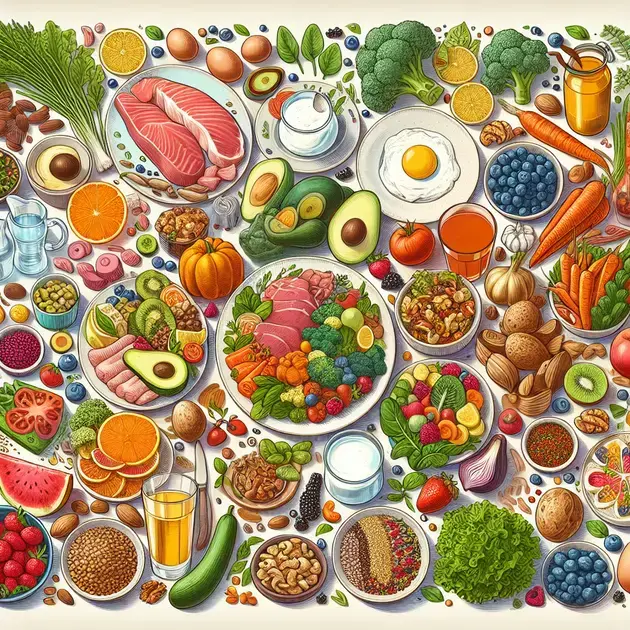Intermittent Fasting: 7 Foods to Break Your Fast
Intermittent fasting (IF) has gained significant popularity in recent years due to its potential health benefits. This dietary approach involves dividing your day into two halves – the fasting window and the eating window. While adhering to the designated periods of eating and fasting can be challenging, what you consume when breaking your fast is equally important. In this article, we will discuss seven foods that are ideal for breaking your fast during intermittent fasting.
1. Lean proteins:
After a period of fasting, it is essential to replenish your body with adequate protein. Opt for lean sources such as chicken breast, turkey, fish, or tofu. These protein-rich foods will help repair and rebuild your muscles, support satiety, and provide essential amino acids for overall health.
2. Eggs:
Eggs are a versatile food option that can easily fit into your post-fast meal. Packed with high-quality protein, healthy fats, and essential nutrients, they offer a range of benefits. You can enjoy them boiled, scrambled, or in an omelet with vegetables for a wholesome meal.
3. Whole grains:
Including whole grains like quinoa, brown rice, or oats in your post-fast meal can provide sustained energy and essential nutrients. These complex carbohydrates will help replenish your glycogen stores and keep you feeling fuller for longer periods.
4. Fruits and vegetables:
Breaking your fast with a variety of fruits and vegetables adds essential vitamins, minerals, and fiber to your meal. Berries, oranges, spinach, kale, and broccoli are excellent options to incorporate into your post-fast meal, promoting overall health and aiding digestion.
5. Nuts and seeds:
Healthy fats are crucial when breaking your fast. Nuts and seeds such as almonds, walnuts, chia seeds, and flaxseeds are good sources of omega-3 fatty acids and other beneficial nutrients. They can be sprinkled over your meals or consumed as a snack for added satiety.
6. Yogurt or kefir:
Probiotic-rich foods like yogurt or kefir can support gut health and aid in digestion. Opt for the unsweetened varieties to avoid added sugars. You can add berries, nuts, or seeds for additional flavor and nutrients.
7. Hydration:
While not a food, maintaining proper hydration is essential when breaking your fast. Drink enough water throughout the day to stay hydrated and support your overall health.
These are just a few examples of foods that you can consume to break your fast during intermittent fasting. Remember, it’s crucial to listen to your body and choose foods that make you feel satisfied and nourished. Experiment with different combinations and find what works best for you. As with any dietary change, it’s always recommended to consult a healthcare professional or registered dietitian before starting intermittent fasting.
Intermittent Fasting: 7 Foods to Break Your Fast
Intermittent fasting (IF) is a dietary practice that involves dividing your day into two distinct periods – the fasting window and the eating window. In this routine, it can often present a challenge to transition from one window to the other, specifically when it comes to breaking your fast. The key to effectively breaking your fast lies in consuming the appropriate foods in the correct quantities. Here are seven foods that are highly recommended for breaking your fast:
1. Protein-rich foods:
Starting your eating window with a protein-rich meal can help to kickstart your metabolism and provide the necessary nutrients for muscle repair and growth. Good options include eggs, lean meats, poultry, fish, and plant-based proteins like tofu or tempeh.
2. Fiber-packed fruits and vegetables:
Including fruits and vegetables in your first meal after fasting can help replenish essential vitamins, minerals, and antioxidants. Focus on fiber-rich options such as berries, leafy greens, broccoli, and carrots, which can aid in digestion and provide a feeling of fullness.
3. Complex carbohydrates:
Complex carbohydrates like whole grains, quinoa, brown rice, and sweet potatoes can be an excellent energy source after a fast. They provide sustained energy and help stabilize blood sugar levels.
4. Healthy fats:
Incorporating healthy fats into your meal can promote satiety and provide essential nutrients. Avocado, nuts, seeds, and olive oil can be great additions to your first meal after fasting, providing beneficial omega-3 fatty acids.
5. Yogurt or fermented foods:
Probiotic-rich foods like yogurt or fermented vegetables can support gut health and digestion. Adding these foods to your meal can enhance nutrient absorption and promote a healthy gut microbiome.
6. Hydrating fluids:
It’s essential to hydrate your body after the fasting window. Opt for water, herbal teas, or infused water with lemon or cucumber slices. Avoid sugary beverages that can spike blood sugar levels and break your fast prematurely.
7. Avoid processed and sugary foods:
To maximize the benefits of intermittent fasting, it’s crucial to avoid processed snacks, sugary desserts, and foods high in added sugars. These can lead to blood sugar spikes and hinder the positive effects of fasting on metabolism and insulin sensitivity.
Remember, the key to breaking your fast successfully is to focus on nutrient-dense, whole foods that provide a balance of macronutrients. Prioritizing protein, fiber, healthy fats, and essential vitamins and minerals will help you make the most of your eating window and support overall health and well-being.
